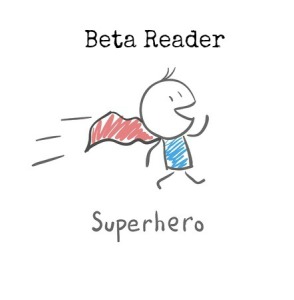Two Navy Guys Talk About Planning for Beta Readers
 Welcome back to Two Navy Guys and a Novel, the blog series where you get to watch two ex-Navy guys thrash through the creative act of writing a military-political thriller. If you’re new to the party, check out our website for previous episodes.
Welcome back to Two Navy Guys and a Novel, the blog series where you get to watch two ex-Navy guys thrash through the creative act of writing a military-political thriller. If you’re new to the party, check out our website for previous episodes.
The end is in sight! If you check the Writing Progress-O-Meter on our webpage, you’ll see we're at 89,000 words, which puts us at 99% complete! Unfortunately, the first draft is going to be more like 100-110,000 words, so I still have some more writing to do. The all-important second draft/revision process has begun and next week I’ll post a progress meter for that process as well.
The topic of today’s post is beta readers. According to editor and writer Belinda Pollard, they are the “superheroes of self-publishing,” and I agree wholeheartedly. As we explained early on, one of our goals in writing this book was to produce a fast-paced, authentic thriller that would hook readers and keep ‘em hooked for the whole ride. For the past four months it’s been JR and I, outlining, writing, and rewriting to get to our goal of a great story. It’s almost time for some outside assistance.
What Kind of Betas Do We Need?
For our project, we are asking a select group to vet specific areas of the story. The manuscript they receive will be complete and revised, but not copy-edited yet.
We can classify our beta readers into four categories:
- Story Critique Betas – these are readers with a long history of reading the thriller genre. We want to hear what they have to say about plot believability, empathy with the characters, and their satisfaction with how the story developed and ended.
- Military Authenticity Betas – Another target group for us are active-duty/recently retired military and/or FBI. JR and I are both veterans so we have a good sense of how to write military ops, but the devil is in the details. These betas are there to answer one question: are the military scenes believable?
- Cultural Authenticity Betas – We have some scenes that take place within other cultures, primarily Iran, that need a set of outside eyes. These people have some specialized language skills as well.
- Casual Reader Betas – The final category are what you might call “Average Joe” readers, people who read occasionally and graze among multiple genres as it strikes their fancy. In this case, we’re hoping to see the potential for the book beyond the hardcore military thriller crowd.
How Many Is Enough?
The trick with betas is to get enough readers for meaningful feedback (and backup, in case one drops out); however, not so many that we are swimming in so much feedback that we can’t process it all. Our plan calls for 7-12 people in total that breaks down like this:
Story Critique – 2-3 betas
Military Critique – 2-4 betas (we may have some just read specific scenes)
Cultural Critique – 1-2 betas, these people are really hard to find
Casual Readers – 2-3 betas
We’ve recruited most of them already, and frankly they’re waiting on us.
Proper Prior Planning Prevents Piss Poor Performance
Many of you will recognize this military witticism as an ode to planning, and beta reader management is no exception. For us, the worst possible feedback is a beta reader who reads the book and sends us a note that says: “Good book. Loved it.”
If that happens, it’s our fault, not the beta reader’s. Again, Belinda Pollard has some great suggestions about how to prep your betas for battle with your novel.
Selecting the right beta reader is only half the equation, here are some of our other considerations:
- What do we want them to look for? – As you can see from our selection criteria above, each category of beta will get their own set of marching instructions. Do I want my casual reader commenting on military strategy? Probably not.
- Big Picture Feedback – Each beta reader will get a (short) questionnaire focused on their area of expertise to give us their “big picture” response.
- In-Process Feedback – We’d also like to get their notes as they’re reading. It’s important to know which parts of the story didn’t work and the best way to measure that is to let them “tag” the section while they're reading it. Are they using a hardcopy, a Word doc with comments, or a Kindle file? It’s going to be different for each person, so we need to be ready.
For us, the beta reader stage might be the single most important step in the production of our novel and we’re pretty darn excited about it.
We’re still 4-6 weeks away from having a beta-ready manuscript, so we have some time to work through the more detailed planning steps. That said, there’s lot of work to do to make sure this important step in the development of Weapons of Mass Deception comes off well.
David Bruns is the creator of the sci-fi series The Dream Guild Chronicles, and one half of the Two Navy Guys and a Novel blog series about co-writing the military thriller, Weapons of Mass Deception. Check out his website for a free sample of his work.

